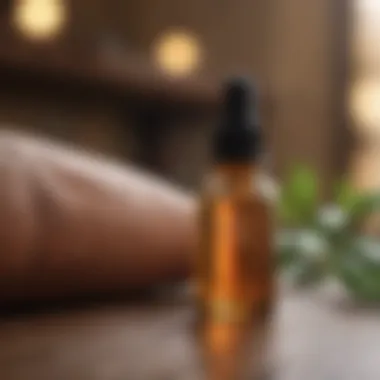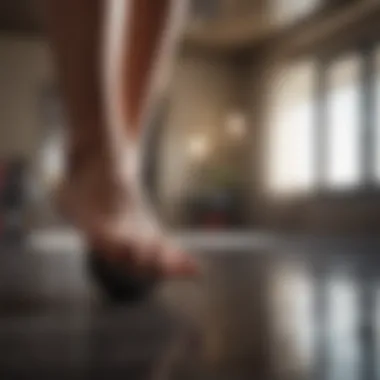Home Remedies for Itching Feet Relief


Intro
Itching feet can be a distressing issue for many individuals. The sensation is often irritable, and it can disrupt daily activities. Various factors contribute to the problem, such as environmental irritants, skin disorders, or infections. In this article, we will explore a range of effective home remedies to alleviate this discomfort.
By focusing on natural solutions, we aim to provide readers with practical and simple methods to manage their itchy feet. Understanding the underlying causes is equally important, as this knowledge can help in preventing future occurrences. Whether it is dry skin, fungal infections, or allergies, addressing these root causes can lead to a more long-term solution.
With easily accessible ingredients and preparation tips, this guide is designed for individuals seeking relief and enhanced foot health. It is appropriate for health professionals, wellness coaches, and others in the wellness field, providing them with valuable insights to assist their clients.
Key Benefits of This Article
- Gain knowledge on natural remedies
- Learn about preparation and application methods
- Understand the underlying causes of itchy feet
- Discover preventative measures to avoid future problems
This in-depth examination will help readers take informed steps toward healthier and more comfortable feet.
Understanding Itchy Feet
Itchy feet can be more than just a simple annoyance. They represent a symptom that often signifies underlying conditions or irritations. A thorough understanding of this issue is essential for effective management and alleviation. By becoming familiar with the common causes, symptoms, and triggers, individuals can better navigate the discomfort associated with itchy feet.
Identifying why one's feet itch is crucial for targeted treatment. It can also help individuals make more informed lifestyle choices that prevent recurrence. Furthermore, many people initially dismiss the itching as trivial, ignoring it until it escalates into more severe issues. A gentle reminder: constant scratching can lead to skin damage, introducing infections and further complications. Therefore, proactive education on itchy feet is an investment in foot health and general well-being.
Common Causes of Itchy Feet
Many factors contribute to itchy feet. Common causes can range from environmental irritants to persistent medical conditions. Notably, athletes' foot is a prevalent fungal infection affecting many individuals. It thrives in damp conditions, often found in communal spaces like pools or gyms.
Other causes include:
- Dry skin, particularly in harsh weather conditions.
- Allergic reactions to materials used in footwear or socks.
- Skin conditions such as eczema or psoriasis, which can manifest on the feet.
- Insect bites and stings that may cause localized itching.
- Some systemic conditions, like liver disease or diabetes, where itching can be a secondary symptom.
Recognizing these triggers is the first step toward finding relief.
Symptoms Associated with Itching
The symptoms related to itchy feet can vary widely. Initially, the primary symptom is obviously itching. However, additional signs might accompany this itching. For instance, redness, swelling, and flaking skin are common. Severe itching may also cause lesions or crusts from constant scratching. Any persistent change in the state of your skin warrants attention.
Moreover, other signs may include:
- A burning sensation around the affected area.
- Blistering or oozing if secondary infections are present.
- Changes in color or texture of the skin.
It’s essential to monitor these symptoms closely, as they provide valuable information about the underlying issue.
When to Seek Medical Advice
Not all cases of itchy feet require medical attention. However, certain warning signs should not be ignored. If the itching is persistent, worsening, or accompanied by severe symptoms such as swelling or discharge, it’s advisable to consult a health professional. In particular, individuals with pre-existing health conditions should approach this issue carefully.
"If the itching persists despite home remedies or is accompanied by other significant symptoms, seeking professional help is key."
Other indicators that suggest medical intervention include:
- Observing signs of infection like fever or significant redness.
- Skin changes that remain unexplained or worsen over time.
- If the itching interrupts daily activities or sleep.


In summary, understanding the root causes, symptoms, and when to seek help leads to better foot health outcomes. Knowledge positions individuals on the path towards effective remedies and management strategies.
Natural Ingredients for Itchy Feet Relief
Natural ingredients offer a promising approach to alleviate itchy feet. Their relevance lies in their accessibility and comfort that they can provide without relying on synthetic products. Many individuals seek alternatives that have fewer side effects. The following ingredients have been shown to possess soothing properties that can help reduce itching and promote overall foot health.
Aloe Vera
Aloe vera is celebrated for its soothing and moisturizing properties. It contains compounds like glucomannan and gibberellins, which can help reduce inflammation and accelerate healing. Applying aloe vera gel directly to itchy areas can provide relief almost instantly. This natural remedy not only calms irritation but also nourishes the skin, making it more resilient against future irritations. It is wise to use pure forms of aloe vera to maximize these benefits.
Coconut Oil
Coconut oil is known for its antifungal and antibacterial qualities. When applied to the skin, coconut oil forms a layer of moisture that helps prevent dryness. This ingredient contains lauric acid, which can combat fungal infections, a common cause of itchy feet. Massage a small amount of coconut oil onto the affected areas after bathing. The skin absorbs it quickly, thus replenishing lost moisture and keeping itching at bay.
Baking Soda
Baking soda acts as a gentle exfoliant and can help soothe itching. Its alkaline properties neutralize skin irritation effectively. A paste made from baking soda and water can be applied to itchy regions for quick relief. Alternatively, a warm foot soak with baking soda can help reduce itching and refresh tired feet. Both methods allow the baking soda to absorb excess moisture, which is often a contributing factor to itching.
Oatmeal
Colloidal oatmeal is known for its skin-soothing effects, often used in various skincare products. This ingredient contains antioxidants and anti-inflammatory properties that can ease itching. To benefit from oatmeal, consider adding it to a warm foot bath. This method allows the oatmeal to release its beneficial properties while offering a relaxed experience. It's essential to ensure that you rinse your feet thoroughly after soaking to avoid any residue.
Apple Cider Vinegar
Apple cider vinegar is notable for its acidic nature that may help restore skin's natural pH balance. This balance is crucial for maintaining healthy skin. When diluted with water, it can be applied as a topical treatment. It may also help in combating fungal infections, which are common culprits behind itching. However, it is important to test on a small skin area first to avoid potential irritation. Regular use can enhance skin health and reduce discomfort.
Home Remedies to Relieve Itching
Addressing itchy feet effectively is an essential aspect of skincare that directly impacts comfort and overall foot health. It is not just about alleviating the symptoms; it is also about tackling underlying issues related to skin irritation, dryness, or infections. Home remedies provide accessible, cost-effective solutions that can complement professional medical advice. Many people prefer to start with natural methods, which often involve ingredients that are found at home or are easy to obtain. This approach can help manage mild to moderate conditions while reducing the risk of adverse reactions that may arise from pharmacological treatments.
Utilizing home remedies helps people feel empowered to care for their well-being. There is solace in the idea of nurturing oneself with simple solutions that may hold significant efficacy. Effective treatments can lead to better skin hydration, soothing inflammation, and promising relief from itchiness.
Soothing Soaks
Soaking the feet in mildly warm water is among the simplest and most effective remedies for relieving itchiness. This method not only removes irritants but also provides instant relief. Adding certain ingredients can enhance the benefits. For example, Epsom salt is often suggested due to its anti-inflammatory properties, which may help to soothe the skin.
To prepare a soothing soak, fill a basin with warm water and mix in about half a cup of Epsom salt. Soak your feet for approximately 15-20 minutes. Rinse with cold water and pat dry. The cooling sensation can offer additional comfort, especially if the itching is severe. Other options include introducing baking soda or oatmeal to the soak, both of which have soothing properties that can gently relieve irritation.
Simultaneously, be cautious of allergens or substances that may worsen the itching. Always wash and dry your feet properly after soaking to maintain good hygiene.
Herbal Compresses
Herbal compresses can serve as a powerful natural remedy against itchy feet. Using herbs like chamomile or lavender, which have known anti-inflammatory and calming effects, can provide relief. Preparing a compress is straightforward: brew the herbs in boiling water, allow it to cool, then soak a clean cloth in the herbal infusion.
Once soaked, apply the cloth to the affected areas on your feet. Keep it in place for about 20 minutes. This method not only soothes itching but also promotes relaxation. Using herbal solutions may present fewer side effects compared to synthetic alternatives, making it a good option for those with sensitive skin or allergies.
Moisturizing Routines
Inadequate moisture is a frequent trigger for itching. Hence, incorporating a robust moisturizing routine is crucial. It is paramount to select creams or lotions that contain natural ingredients like aloe vera or coconut oil. Both are known for their ability to hydrate and protect the skin barrier.


Apply moisturizer to clean, dry feet at least twice a day; this will help lock in moisture and reduce dryness. For practical results, consider using a thicker cream or ointment during the nighttime, allowing it to deeply penetrate the skin overnight. Additionally, wearing cotton socks after application can enhance the absorbency and effectiveness of the treatment.
It is essential to explore various options and observe which combination works best for individual conditions. Avoid over-moisturizing as well, which could potentially result in clogged pores or irritation.
Proper care of feet is not only about alleviating symptoms but also about improving overall foot health and well-being.
Adhering to these home remedies can significantly improve the experience of those suffering from itchiness. By blending simple self-care practices with a commitment to consistency, individuals can take control of their foot health, ultimately leading to enhanced comfort and confidence.
Lifestyle Changes to Prevent Itching
Making lifestyle changes can significantly impact your foot health. Itchy feet can often stem from repeated exposure to irritants, poor hygiene, or even footwear choices. Addressing these elements is essential in alleviating ongoing discomfort and preventing future occurrences.
Proper Foot Hygiene
Foot hygiene is foundational in preventing itching. Regular washing with mild, fragrance-free soap is crucial. After washing, be sure to dry your feet thoroughly, especially between the toes. This area tends to retain moisture, which can create a suitable environment for fungi and bacteria that may exacerbate itching.
- Regular Foot Baths: Soaking your feet in warm water can help clean them and relax the skin. Adding Epsom salt can provide additional benefits, as it may reduce inflammation.
- Exfoliation: Regularly exfoliating the skin can remove dead skin cells, preventing buildup that can irritate and lead to itching.
Choosing Appropriate Footwear
Footwear plays a vital role in foot comfort and health. Wearing shoes that are too tight or made from synthetic materials can promote sweating and irritation.
- Select Breathable Materials: Opt for shoes made from natural materials such as leather or canvas. These allow for better airflow and can help keep your feet dry.
- Proper Fit: Shoes should fit well without being too tight. Consider your foot type when choosing shoes, as arch support and cushioning matter.
- Rotating Shoes: Giving your shoes time to air out can reduce moisture buildup. Avoid wearing the same pair daily to limit fungal growth.
Moisture Control Techniques
Managing moisture is key to preventing itching. Excess moisture can lead to skin irritation and fungal infections.
- Choose Moisture-Wicking Socks: Cotton socks can retain moisture. Instead, consider socks made from synthetic materials designed to wick moisture away from your feet.
- Use Foot Powder: Applying foot powder can help absorb excess moisture and keep feet dry. Look for products that contain talc or cornstarch.
- Air Your Feet: Whenever possible, take your shoes off and let your feet breathe. This reduces moisture and allows skin to recover.
Proper care combined with awareness about footwear and moisture can create lasting relief from itchy feet. Regular practices can shape healthier habits.
In summary, focusing on foot hygiene, choosing the right footwear, and controlling moisture can greatly impact the health of your feet. It’s not merely about addressing current issues, but rather about establishing a routine that promotes ongoing comfort.
Dietary Considerations
Dietary considerations play a crucial role in alleviating itching feet. The right nutrients can support skin health, enhance overall well-being, and potentially reduce the frequency and severity of itching. It is important to understand how certain dietary elements can influence skin conditions and help maintain moisture and skin integrity.
Hydration's Role in Skin Health
Staying adequately hydrated is fundamental for skin health. Water helps maintain skin's elasticity and moisture levels. Dehydration can exacerbate dryness, leading to itching and discomfort.
To ensure proper hydration:
- Aim for at least 8 glasses of water daily. This is a general guideline; individual needs may vary.
- Consume hydrating foods, such as cucumbers, watermelon, and oranges, which contribute to your overall fluid intake.
- Monitor urine color. Light yellow indicates good hydration, while dark yellow suggests the need for more fluid.
Hydration affects every cell in the body, including skin cells. By prioritizing fluid intake, you can help mitigate itching and support your skin’s health.
Nutrient-Rich Foods


Incorporating nutrient-rich foods into your diet is essential for maintaining skin health and minimizing itching. Certain vitamins and minerals play key roles in skin repair and function.
- Omega-3 Fatty Acids: Found in fish like salmon, flaxseeds, and walnuts, omega-3s help reduce inflammation and keep skin hydrated.
- Vitamin E: Present in nuts, seeds, and green leafy vegetables, vitamin E is an antioxidant that can protect skin cells from damage.
- Zinc: Important for skin healing, zinc can be found in foods such as chickpeas, lentils, and red meat.
A well-balanced diet, rich in these nutrients, not only nourishes your skin but also strengthens the immune system and reduces the chances of inflammatory conditions that may cause itching.
Remember, nourishing your body is a vital step towards achieving and maintaining healthy skin, ultimately helping to alleviate itching and discomfort.
Cautions and Considerations
When navigating the landscape of home remedies for itching feet, it is essential to prioritize awareness regarding potential cautions and considerations. While many natural solutions can provide relief, some may pose risks, especially if not applied or understood properly. Home remedies may affect individuals differently, and what works for one person may cause irritation in another. This highlights the need for a cautious approach when experimenting with various treatments.
Allergic Reactions to Home Remedies
Individuals exploring home remedies for itching should be mindful of possible allergic reactions. Natural ingredients, while generally perceived as safe, can trigger sensitivities in some users. For instance, substances like apple cider vinegar and oatmeal can lead to skin irritation or allergic responses in certain people. It is advisable to perform a patch test before comprehensive application. Apply a small amount of the remedy to a discreet area of skin and observe for any adverse reactions over the next 24 hours.
Here are some tips:
- Always start with small amounts.
- Document any reactions you observe.
- Consult with a healthcare provider if reactions occur, especially if they are severe.
"Understanding one’s skin type and potential reactions is key to safely utilizing home remedies."
This caution applies particularly to those with pre-existing skin conditions or sensitivities.
Underlying Conditions to Monitor
It is crucial to consider the possibility of underlying health conditions that may contribute to itchy feet. Skin disorders like eczema, psoriasis, or fungal infections often mimic simple itchiness but require more targeted treatment. As such, if the itching persists despite trying home remedies, a visit to a healthcare professional is warranted.
Monitoring additional symptoms can provide vital clues about potential underlying issues. Consider items such as:
- Redness, swelling, or peeling
- Presence of blisters or sores
- Areas of warmth or increased sensitivity
If any of these indicators arise, seeking medical advice becomes paramount. Early intervention can prevent complications and ensure appropriate treatment pathways are followed. By recognizing underlying conditions, individuals can avoid exacerbating their symptoms with unsuitable remedies and find more effective solutions.
Culmination
The conclusion serves as a vital summary of the previous sections and a stepping stone for further action. The key to relieving itchy feet lies in understanding the diverse causes and implementing effective home remedies. Recognizing that each individual may respond differently to various treatments allows for a tailored approach.
Summarizing Effective Strategies
To alleviate itching, various home remedies have been identified. Among the most effective strategies are:
- Soothing soaks in warm water infused with ingredients like oatmeal or apple cider vinegar. This approach provides immediate relief and moisturizing benefits to the skin.
- Herbal compresses using natural ingredients such as chamomile, which can calm irritated skin. The application methods require immersing cloths in herbal solutions and placing them gently on affected areas.
- Moisturizing routines with natural oils, such as coconut oil or aloe vera, help maintain hydration. Regular application after washing feet aids in locking moisture.
In addition to these remedies, maintaining proper foot hygiene and monitoring one's diet also plays a crucial role. Hydration and nutrient-rich foods contribute to overall skin health.
Final Thoughts on Itching Relief
Ultimately, addressing itchy feet requires a multifaceted approach. The use of natural ingredients and home remedies is not only cost-effective but also safe for most individuals. It is essential to be aware of potential allergies when trying new remedies and to consult a healthcare professional if symptoms persist.
Using the strategies discussed in this article empowers individuals to take control of their foot health. Each remedy highlights natural methods that focus on soothing irritation while promoting overall well-being.
"Incorporating small, effective strategies into daily routines can lead to significant improvements in comfort and quality of life."
By understanding and implementing these techniques, readers can better manage their itching symptoms and enhance their daily comfort.







